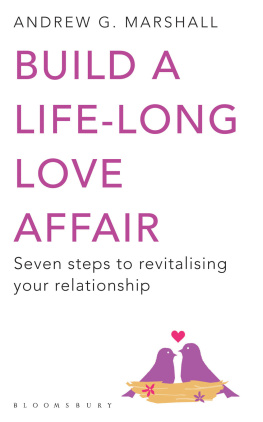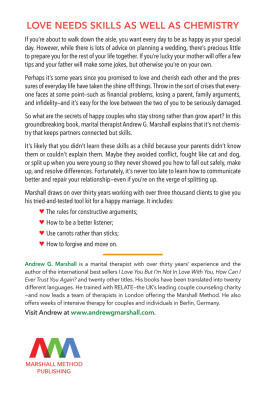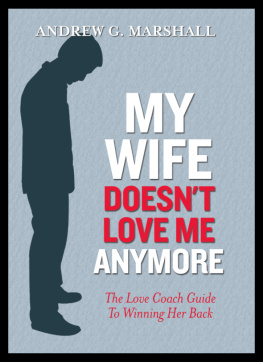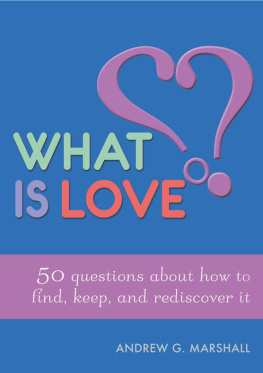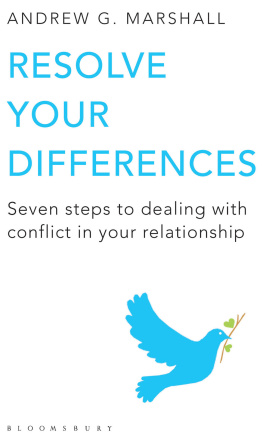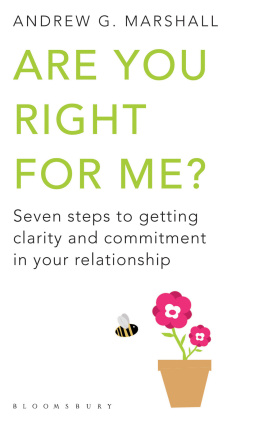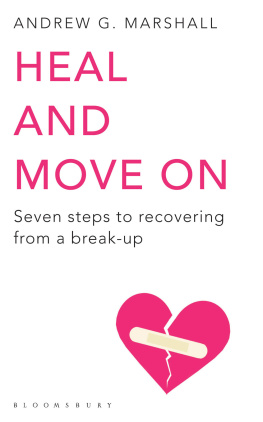I love you
but Im not in love with you
What happens when the passion goes?
Andrew G. Marshall

Bloomsbury Publishing, London, Berlin and New York
First published in Great Britain in 2006 by Bloomsbury Publishing Plc
36 Soho Square, London, W1D 3QY
This electronic edition published in 2011 by Bloomsbury Publishing
Plc
Copyright 2006 by Andrew G. Marshall
Extracts reproduced from The Tipping Point by Malcolm Gladwell by
permission of Little, Brown, a division of Time Warner Book Group UK.
Malcolm Gladwell.
Twiggys story of how she met Leigh Lawson first appeared in a different
form as an interview in Woman and Home, May 2001.
The moral rights of the author and illustrator has been asserted
All rights reserved
You may not copy, distribute, transmit, reproduce or otherwise
make available this publication (or any part of it) in any form, or by any
means
(including without limitation electronic, digital, optical, mechanical,
photocopying,
printing, recording or otherwise), without the prior written permission of the
publisher. Any person who does any unauthorised act in relation to this
publication
may be liable to criminal prosecution and civil claims for damages
A CIP catalogue record for this book is available from the British
Library
ISBN 978 1 4088 1098 9
www.bloomsbury.com/andrewgmarshall
Visit www.bloomsbury.com to find out more about our authors and their books.
You will find extracts, authors interviews, author events and you can sign up for newsletters to be the first to hear about our latest releases and special offers.
To Polly Vernon and Ed Jaspers
Thank you for helping get this book off the ground.
Contents
Five years ago the occasional couple would present themselves at my therapy office after one partner had confessed, I love you but Im not in love with you. At first I was surprised; the phrase seemed to belong to a character in a smart New York sitcom. Yet real people were using it to describe something profound that was happening to their relationship. How could someone love but not be in love?
These couples would describe each other as best friends, or say that their relationship was more like that of a brother and sister, except most were still having sex. In essence, the partnership had become defined by companionship rather than passion, and that was no longer enough. Over time more and more couples complained of the same problem. Not everyone spontaneously used the phrase, I love you but Im not in love with you, but all recognised the sentiments. For these couples the dilemma was especially painful: the person who had fallen out of love still cared deeply about his or her partner, and certainly did not wish to hurt them, but they wanted to end the relationship.
A typical couple would be Nick, a forty-two-year-old sales manager, and Anna, a thirty-nine-year-old teacher. Nick and Anna had been married for fifteen years and, despite some difficult patches, such as Nicks redundancy, their relationship had flourished. So when Nick dropped the I love you but bombshell Anna was devastated: I thought we had a happy relationship, I really did. Not perfect, of course, but then who can claim that? Ive tried to get him to explain why he doesnt love me any more but he keeps saying he doesnt know. The best he has managed is that I dont listen. Except hes never told me before that he was unhappy. Nick explained that the feeling had been building for several years and that he needed to tell their two teenage children and have a trial separation. He has no honour, no loyalty, Anna complained. He is completely selfish. I feel hes leaving me for someone he hasnt even met yet.
Faced with couples like Nick and Anna, I turned to the professional literature but found it dominated by couples who dislike, or even hate, each other, whereas I needed to know about couples who did not love enough. Worse still, I could find no research into how prevalent the problem had become, no theories about why it should be happening now or any suggested treatment programme. There was only one solution: I would have to fill the gap myself.
I initiated a research project in which all couples seeking help were asked to fill in a questionnaire after their first session. They were given a list of common problems that might have brought them into counselling. The results were startling: 47 per cent complained that the passion had gone, and 43 per cent said, I love my partner but Im no longer in love/My partner no longer loves me. Many of the traditional reasons for seeking help polled much lower: money issues were noted by 24 per cent, an affair by 21 per cent; differing opinions on how to bring up children were cited by 19 per cent, and out-of-control fights by 15 per cent. When couples were asked to choose the problem causing the most distress, I love my partner but Im no longer in love/My partner no longer loves me came third, with 24 per cent, close behind difficulty understanding each others viewpoint with 26 per cent and argue too much with 25 per cent.
The research also backed up something that I had observed in my therapy office: people who ticked the I love you but option were less likely also to tick we argue too much and more likely to pick the neutral we find it difficult to understand each others viewpoints. Anna certainly did not like arguments: My parents would scream at each other the whole day long, and I swore Id never put my kids through the same thing. If the worst came to the worst, she would simply walk away. Meanwhile Nick was so considerate, and so good at seeing her side, that he talked himself out of any disagreement: I wish that Anna didnt go up to bed so early. I dont get in until late and Im left tiptoeing round the house alone, but its not her fault really because after ten she can hardly stay awake. In fact, they were both so thoughtful that the only open source of friction was that both enjoyed and therefore wanted to do the ironing. This might sound like heaven, but when someone cannot truly voice their feelings even if only about minor issues the relationship cools. Slowly over the years, degree by degree, all the emotions are dulled. Ultimately it is as harmful to row seldom, as it is to row all the time.
My second observation from my I love you but (ILYB) clients was that this lack of argument exacerbates the tendency for two partners to grow more like each other. The modern trend to be friends as well as lovers is another pressure, as we normally choose friends who are like us. This may seem wonderful but relationships need friction too. It is the grit in the oyster that makes the pearl and the difference that provides the love interest. More importantly, when there is so much pressure to be everything to each other, to share friends and even tastes, there is little room to be an individual as well as one half of a couple. I started to feel that I couldnt be myself, explained Nick, I was trapped by what people expected of me.
The third key observation was that most partners who had fallen out of love had recently had a life-changing experience. In Nicks case it was the death of his father: I remember standing at the foot of his bed and thinking, Shouldnt I be doing something with my life? Worse still, I could see how little time I had. While Nick was struggling with abstract questions about the meaning of life, Anna retreated into herself too: I was close to Nicks dad hed almost been a second father but I thought Id be of most help offering support. So I held back my tears and didnt burden him with my grief too. While she thought she was being strong for Nick, he read her response to his fathers death as unfeeling and felt very alone. Instead of sharing their different reactions, neither said anything for fear of upsetting the other. It was not until later in counselling that all Nicks resentment came tumbling out. Other events, like reaching a milestone birthday, the birth of a child or a parental divorce, can also trigger a crisis of self-examination which, in turn, can tip over into questioning the relationship.


